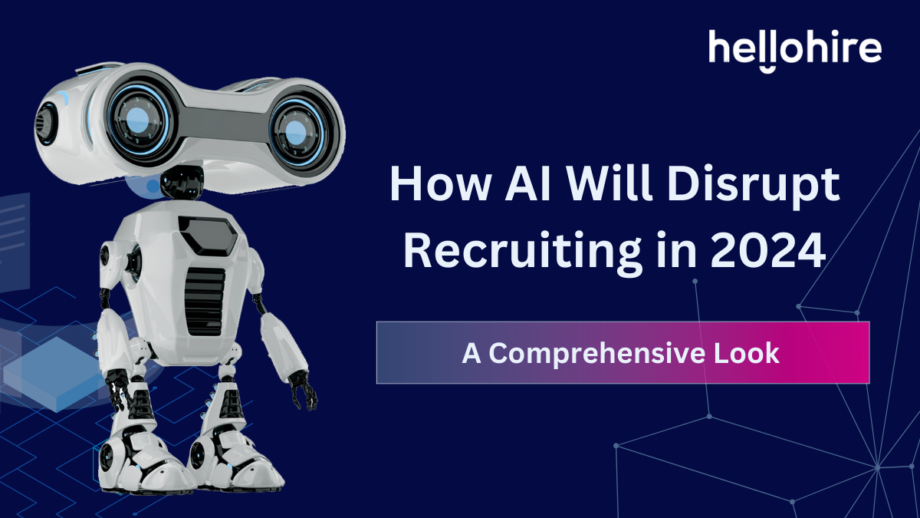The recruiting landscape is on the cusp of a revolution, with artificial intelligence (AI) leading the charge. As we move toward 2024, the integration of AI into recruiting processes signifies a transformative shift in how organizations identify, attract, and hire talent. This in-depth article explores the multifaceted impact of AI on recruiting in 2024, highlighting its potential to streamline operations, enhance candidate engagement, and redefine talent acquisition strategies.
The Rise of AI in Recruiting
Artificial intelligence in recruiting encapsulates the use of machine learning, natural language processing, and other AI technologies to automate and optimize the recruitment process. From sifting through resumes to conducting preliminary interviews, AI is poised to handle tasks traditionally performed by human recruiters, but with increased efficiency and accuracy. This section delves into the core areas where AI is set to disrupt recruiting in 2024.
Transforming Candidate Sourcing with AI
AI’s influence extends beyond mere automation, revolutionizing how companies source potential candidates. Traditional sourcing methods often limit the talent pool and can overlook highly qualified individuals. In contrast, AI-powered sourcing tools leverage algorithms to scan a vast array of digital platforms — social media, professional networks, and even passive candidate databases — to identify and engage with a diverse set of potential candidates. This proactive and expansive approach ensures access to a wider, more varied talent pool, enhancing the chances of finding the perfect match for any given role.
Predictive Analytics and Data-Driven Recruiting
Predictive analytics stands out as a game-changer in AI-driven recruiting. By analyzing historical data and identifying patterns, AI can predict hiring needs, candidate success, and potential turnover risks. This foresight allows organizations to proactively address staffing needs, tailor recruitment strategies, and ensure alignment with long-term business goals. The result is a more strategic, data-informed approach to talent acquisition that prioritizes long-term success over short-term fixes.
Streamlining Screening and Interview Processes
The screening phase represents a significant bottleneck in traditional recruiting workflows. AI technology offers a solution by automating the screening of resumes and cover letters, efficiently parsing through thousands of applications to identify those best matched to the job criteria. Moreover, AI-driven interviewing tools can conduct initial screenings, using pre-set algorithms to evaluate candidates’ responses to standard questions. This automation not only accelerates the recruitment process but also introduces a level of objectivity, minimizing unconscious bias and promoting fairness in candidate selection.
Enhancing Candidate Experience through Personalization
AI’s potential to personalize the recruitment experience is a significant advantage. Through AI-driven communication tools, organizations can maintain continuous engagement with candidates, offering personalized updates, feedback, and guidance throughout the recruitment journey. This personalized interaction not only improves the candidate experience but also strengthens the employer brand, making the organization more attractive to top talent. Additionally, AI can provide job seekers with tailored job recommendations, aligning their skills and preferences with available opportunities for a more efficient job search.
The Role of Continuous Learning in AI Recruitment
AI systems are inherently designed to learn and improve from each interaction, a feature that will be crucial in the evolving recruitment landscape of 2024. Continuous learning algorithms will enable AI tools to adapt to changes in hiring trends, refine screening criteria, and enhance their accuracy in matching candidates to roles. This ability to learn and adapt ensures that AI-driven recruitment processes become more effective and efficient over time, continually improving the quality of hires and the overall recruitment experience.
Navigating Challenges and Ethical Considerations
While the benefits of AI in recruiting are clear, it’s essential to address the associated challenges and ethical considerations. Concerns around data privacy, algorithmic bias, and the transparency of AI decision-making processes are at the forefront. Organizations must navigate these challenges with care, ensuring that AI is implemented in a way that is ethical, responsible, and inclusive. This involves adopting transparent AI systems, continually monitoring for bias, and ensuring that human oversight remains a key component of the AI-driven recruitment process.
Preparing for the Future of AI in Recruiting
As we approach 2024, organizations must prepare for the impact of AI on recruiting. This preparation involves not only investing in AI technologies but also training HR professionals to work alongside AI tools effectively. Emphasizing the strategic integration of AI, fostering a culture of innovation, and prioritizing ethical considerations will be crucial for organizations looking to harness the full potential of AI in recruitment.
Conclusion: Embracing AI-Driven Recruitment in 2024
The disruptive potential of AI in recruiting is undeniable. As we look toward 2024, AI is set to transform the recruitment landscape, offering unprecedented efficiency, enhanced candidate experiences, and a more objective, data-driven approach to talent acquisition. By embracing AI, organizations can navigate the challenges of recruiting in an increasingly competitive market, securing the right talent to drive future success. However, the journey toward AI-driven recruitment must be navigated with a commitment to ethical practices, ensuring that the revolution in talent acquisition benefits all stakeholders and sets a new standard for the future of work.

